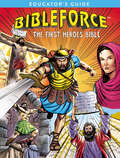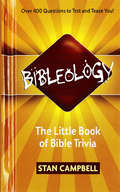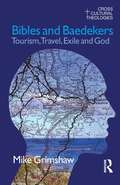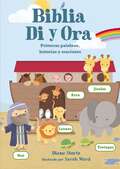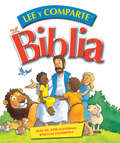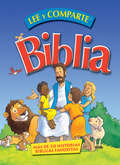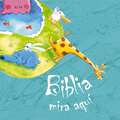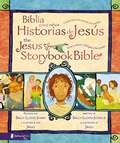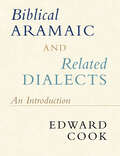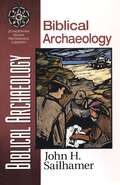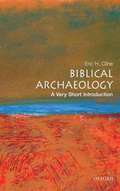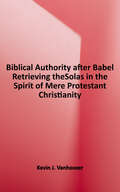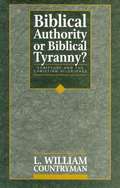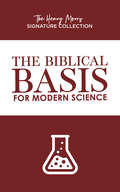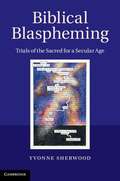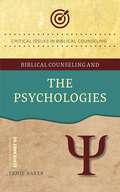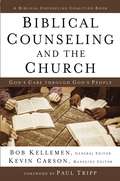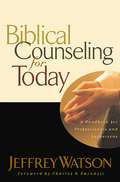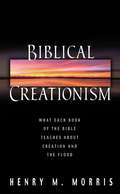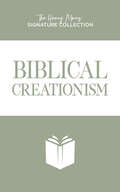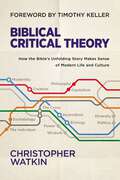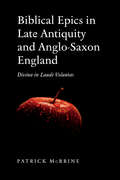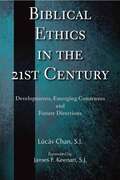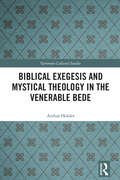- Table View
- List View
BibleForce Educator's Guide: The First Heroes Bible
by Thomas NelsonBibleForce Educator's Guide is a companion to BibleForce: The First Heroes Bible. This guide can be utilized in the classroom, in a home school setting, or by parents seeking additional resources. Ideal for children, 6-10.
Bibleology: The Little Book of Bible Trivia
by Stan CampbellPeople who love trivia games won't be able to put down BIBLEOLOGY, which contains dozens of test-your-knowledge questions. Whether you consider yourself a novice or an expert, BIBLEOLOGY is an engaging way to get more familiar with this fascinating collection of people's interactions with the God of the universe.
Bibles and Baedekers: Tourism, Travel, Exile and God
by Michael GrimshawContemporary tourism and travel have become a form of religion, a new opiate of the masses. However, could Church and theology be religious forms of tourism and travel? 'Bibles and Baedekers' offers a theology of tourism and exile for a modern and postmodern world. It examines the ways in which location, identity and movement have made use of religious texts and metaphor and questions the relative absence of secular texts and ideas in theology. The theology of the tourist and traveller is one of new experiences, the acquisition of identity through movement. 'Bibles and Baedekers' uniquely applies this to the postmodern Christian, embodying the fulfilment of Bonhoeffer's 'religionless Christianity', dislocated from both a secular and 'religious' world.
Biblia Di y Ora: Primeras palabras, historias y oraciones
by Diane StortzHistorias bíblicas sencillas para niños de uno a cuatro años de edad, presentadas con texto fácil de comprender e imágenes coloridas para que los niños las señalen, nombren y aprendan. Una herramienta atractiva para que los padres enseñen a sus hijos la palabra de Dios en una forma entretenida y adecuada para su edad. Escucha la historia bíblica, repite el versículo, ora y encuentra los objetos clave en cada página.¡Lea y aprenda de la Biblia con sus hijos! Experimente la Biblia junto a sus niños en una manera nueva y diferente. Los niños disfrutarán señalando y nombrando objetos en cada página para el aprendizaje temprano. Lo que es más importante, descubrirán sus historias bíblicas favoritas, apropiadas para su edad con versículos de las Escrituras y oraciones breves que también guardan la Palabra de Dios en los corazones de los niños.
Biblia Lee y comparte: Para Manos Pequeñas
by Gwen Ellis¡La Biblia Lee y Comparte para manos pequeñas, es grande y brillante y con muchas páginas donde aprender acerca de la Palabra de Dios!La Biblia Lee y Comparte para manos pequeñas, es única en su formato y está bien fundamentada en la enseñanza de la Biblia. Con más de 50 historias bíblicas favoritas que son contadas de manera simple, el mensaje extraordinario del amor y cuidado de Dios cautivará de seguro los corazones de los pequeños y les dará un fuerte fundamento bíblico para guiar sus vidas.Con más de 100 muestras de arte, este libro de historias de la Biblia es muy interactivo como medio para fomentar la memorización de las Escrituras y reforzar la comprensión con actividades para padres e hijos.Las historias incluyen a Noé, David, José, Abraham, Pablo, y Cristo, así también como muchos otros personajes y lecciones bíblicas imperecederas.Biblia Lee y Comparte para manos pequeñas, is big and bright with lots of page-turning learning about the Word of God!Packed with more than 50 favorite biblical stories that are simple re-tellings, the gigantic message of God's love and care is sure to win the hearts of little ones and give them a strong Bible foundation to guide their lives.With over 100 pieces of art, this Bible Storybook is highly interactive as it encourages Scripture Memory and reinforces comprehension with quick activities for parents and kids.
Biblia Lee y comparte: para manos pequeñas
by Gwen Ellis¡LaBiblia Lee y Compartepara manos pequeñas, es grande y brillante y con muchas páginas donde aprender acerca de la Palabra de Dios!LaBiblia Lee y Compartepara manos pequeñas, es única en su formato y está bien fundamentada en la enseñanza de la Biblia.
Biblia mira aquí
by Cecilie ViumAcurrúquense mientras comparten el amor de Dios.El elemento educativo de la Biblia mira aquí va de la mano con la introducción de los niños pequeños a Dios y la Biblia. Se presentan palabras sencillas en un contexto bíblico, y los niños aprenden a reconocer las palabras basándose en ilustraciones graciosas y cariñosas, a medida que aprenden valiosísimas historias bíblicas.
Biblia para niños, Historias de Jesús / The Jesus Storybook Bible: Cada historia susurra su nombre (Jesus Storybook Bible)
by Sally Lloyd-JonesLa Biblia para niños – Historias de Jesús edición especial bilingüe cuenta la historia que subyace detrás de todas las otras historias de la Biblia. En el centro de la misma se encuentra un niño, el niño del cual dependería todo. Cada relato susurra su nombre. Desde los tiempos de Noé, Moisés y el gran rey David, toda historia apunta hacia él. Es como la pieza que falta en un rompecabezas… la pieza que hace que todas las demás encajen en su lugar. Desde el Antiguo Testamento hasta el Nuevo Testamento, conforme la historia se desenvuelve, los niños recogerán los indicios y armarán el rompecabezas. Siendo una Biblia como ninguna otra, la Biblia para niños – Historias de Jesús invita a los niños a unirse en la mayor de todas las aventuras para descubrir por sí mismos que Jesús está en el centro de la gran historia divina de la salvación… y en el centro de la historia de ellos también.
Biblical Aramaic and Related Dialects: An Introduction
by Edward CookBiblical Aramaic and Related Dialects is a comprehensive, introductory-level textbook for the acquisition of the language of the Old Testament and related dialects that were in use from the last few centuries BCE. Based on the latest research, it uses a method that guides students into knowledge of the language inductively, with selections taken from the Bible, the Dead Sea Scrolls, and papyrus discoveries from ancient Egypt. The volume offers a comprehensive view of ancient Aramaic that enables students to progress to advanced levels with a solid grounding in historical grammar. Most up-to-date description of Aramaic in light of modern discoveries and methods. Provides more detail than previous textbooks. Includes comprehensive description of Biblical dialect, along with Aramaic of the Persian period and of the Dead Sea Scrolls. Guided readings begin with primary sources, enabling students learn the language by reading historical texts.
Biblical Archaeology (Zondervan Quick-Reference Library)
by John H. SailhamerWhen busy people want to know more about the Bible and the Christian faith, the Zondervan Quick-Reference Library offers an instant information alternative. Covering the basics of the faith and Bible knowledge in an easy-to-use format, this series helps new Christians and seasoned believers find answers to their questions about Christianity and the Bible. The information is presented in units of one or two pages, so that each section can be read in a few minutes. The Zondervan Quick-Reference Library makes important knowledge affordable, accessible, and easy to understand for busy people who don’t have a lot of time to read or study.
Biblical Archaeology: A Very Short Introduction
by Eric ClinePublic interest in biblical archaeology is at an all-time high, as television documentaries pull in millions of viewers to watch shows on the Exodus, the Ark of the Covenant, and the so-called Lost Tomb of Jesus. Important discoveries with relevance to the Bible are made virtually every year—during 2007 and 2008 alone researchers announced at least seven major discoveries in Israel, five of them in or near Jerusalem. Biblical Archaeology offers a passport into this fascinating realm, where ancient religion and modern science meet, and where tomorrow's discovery may answer a riddle that has lasted a thousand years. Archaeologist Eric H. Cline here offers a complete overview of this exciting field. He discusses the early pioneers, such as Sir William Matthew Flinders Petrie and William Foxwell Albright, the origins of biblical archaeology as a discipline, and the major controversies that first prompted explorers to go in search of objects and sites that would "prove" the Bible. He then surveys some of the most well-known biblical archaeologists, including Kathleen Kenyon and Yigael Yadin, the sites that are essential sources of knowledge for biblical archaeology, such as Hazor, Megiddo, Gezer, Lachish, Masada, and Jerusalem, and some of the most important discoveries that have been made, including the Dead Sea Scrolls, the Mesha Inscription, and the Tel Dan Stele. Subsequent chapters examine additional archaeological finds that shed further light on the Hebrew Bible and New Testament, the issue of potential frauds and forgeries, including the James Ossuary and the Jehoash Tablet, and future prospects of the field. Biblical Archaeology: A Very Short Introduction captures the sense of excitement and importance that surrounds not only the past history of the field but also the present and the future, with fascinating new discoveries made each and every season. ABOUT THE SERIES: The Very Short Introductions series from Oxford University Press contains hundreds of titles in almost every subject area. These pocket-sized books are the perfect way to get ahead in a new subject quickly. Our expert authors combine facts, analysis, perspective, new ideas, and enthusiasm to make interesting and challenging topics highly readable.
Biblical Authority After Babel: Retrieving the Solas in the Spirit of mere Protestant Christianity
by Kevin J. VanhoozerHow the Five Solas Can Renew Biblical Interpretation In recent years, notable scholars have argued that the Protestant Reformation unleashed interpretive anarchy on the church. Is it time to consider the Reformation to be a 500-year experiment gone wrong? World-renowned evangelical theologian Kevin Vanhoozer thinks not. While he sees recent critiques as legitimate, he argues that retrieving the Reformation's core principles offers an answer to critics of Protestant biblical interpretation. Vanhoozer explores how a proper reappropriation of the five solas--sola gratia (grace alone), sola fide (faith alone), sola scriptura (Scripture alone), solus Christus (in Christ alone), and sola Deo Gloria (for the glory of God alone)-- offers the tools to constrain biblical interpretation and establish interpretive authority. He offers a positive assessment of the Reformation, showing how a retrieval of "mere Protestant Christianity" has the potential to reform contemporary Christian belief and practice. This provocative response and statement from a top theologian is accessibly written for pastors and church leaders.
Biblical Authority or Biblical Tyranny?: Scripture and the Christian Pilgrimage
by William CountrymanCountryman becomes the articulator for the 'critical' right, those Christians who profess the Bible's authority, disagree with the fundamentalist's view, but are often at a loss to express, explain, or defend their own convictions.
Biblical Basis for Modern Science, The: The Revised And Updated Classic (The Henry Morris Signature Collection)
by Henry MorrisThe Bible is Indeed a Book of Science, Revealed By God. We live in a “scientific age,” and the proliferation of scientific knowledge and the resulting technologies seem almost endless. Scientific discoveries and developments, however, can be a danger as well as a blessing to mankind. The modern world is desperately in need of God’s own wisdom concerning the purpose and meaning of true science. When you move beyond modern assumptions and false preconceptions, the Bible is found to not only reveal a thoroughly modern perspective on the real facts and principles of science but also to provide wisdom and guidance concerning its proper role in human life. Biology is the science of life, and Christ himself is “life.” Geology is the science of the earth, and He is the Creator of the ends of the earth. We also could speak of other sciences, but all must ultimately be ascribed to Christ. True knowledge of any component of His creation must depend ultimately on the knowledge of Christ and His Word. Reveals biblical insights for cosmology, astronomy, physics, thermodynamics, chemistry, geology, paleontology, biology, anthropology, and more Brings to light how scientific and statistical evidence, rationally evaluated, favor God over evolution
Biblical Blaspheming
by Yvonne SherwoodThis book explores the strange persistence of 'blasphemy' in modern secular democracies by examining how accepted and prohibited ways of talking and thinking about the Bible and religion have changed over time. In a series of wide-ranging studies engaging disciplines such as politics, literature and visual theory, Yvonne Sherwood brings the Bible into dialogue with a host of interlocutors including John Locke, John Donne and the 9/11 hijackers, as well as artists such as Sarah Lucas and René Magritte. Questions addressed include: - What is the origin of the common belief that the Bible, as opposed to the Qur'an, underpins liberal democratic values? - What kind of artworks does the biblical God specialise in? - If pre-modern Jewish, Christian and Islamic responses to scripture can be more 'critical' than contemporary speech about religion, how does this affect our understanding of secularity, modernity and critique?
Biblical Counseling and The Psychologies
by Ernie BakerIn this book, my intention is to help you, the reader, to understand how a counseling theory is constructed. In addition, I want the book to be a reminder of the foundations and construction of a historic biblical-counseling approaching to life issues. I am hoping this will demonstrate the beauty of Scripture and help us grow in discernment as we hear the claims of other proposed models. Of course, this is all for the glory of God and the good of His people through the power of the gospel.
Biblical Counseling and the Church
by Bob Kellemen Kevin Carson Paul Tripp<P>As people face addictions, deal with loss and grief, and seek help in restoring broken relationships, where can they turn for counsel and assistance?<P> The local church has been uniquely blessed with the gift of the gospel and is able to offer hope and counsel that no other institution on earth can.<P> In Biblical Counseling and the Church, Bob Kellemen and Kevin Carson have assembled over twenty respected ministry leaders who examine the relationship between counseling and the church.<P> This comprehensive resource, part of the Biblical Counseling Coalition series, helps leaders and counselors develop a vision that goes beyond being a church with a biblical counseling ministry to becoming a church of biblical counseling—a church culture that is saturated by “one-another” ministry.<P> Divided into five parts, Biblical Counseling and the Church will help church leaders:<BR> Unite the pulpit ministry of preaching the Word with the personal ministry of the Word in counseling <BR> Offer practical and theological training to equip counselors Launch and lead a counseling ministry, regardless of the size of your church <BR> Bring together the relational focus of small group ministry with the ministry of care and counseling <BR> Better understand the relationship between biblical counseling, church discipline, and conflict resolution <BR> Learn how to use counseling in outreach through “missional” biblical counseling—moving biblical counseling beyond the doors of the church and into the world
Biblical Counseling for Today (Swindoll Leadership Library)
by Jeffrey WatsonIn his preface to this challenging book Jeff Watson describes biblical counseling as "a noble adjective married to a nervous noun."Believers are wise to be skeptical of much that is done in the name of counseling in secular settings. Even under the umbrella of "Christian counseling," one has heard horror stories of cases where God's Word has been misused. But Jeff Watson makes a strong case in this volume for the legitimacy of marrying "biblical" and "counseling."Christian counselors, says Watson, need to cultivate three fundamental skills in their patients:How to tell their stories;How to choose their goals wisely; andHow to practice changes in their lives.Watson helps counselors achieve these goals by drawing on the interactions of Christ, the commands of Scripture, and the actions of the apostles and prophets. Thus he marries counseling and biblical principles.To those of us who are called on to counsel on any level, Charles Swindoll says, "This book will become an invaluable tool for you. I urge you to let it become your manual for proper counseling."
Biblical Creationism
by Henry M. Morris IIICritics of the doctrine of creation often attempt to marginalize the great truths of God's creative acts. The reality, however, is that creation is mentioned in each of the Bible's 66 books. This is one of the great ignored truths of the modern Church. Far from being a trivial issue, or one that can be interpreted many different ways, God's record of creation displays a marvelous and clear consistency throughout. From the symphony of the creation week in Genesis, to the promise of a new heaven and a new earth in Revelation, the Bible speaks of a recent, six-day creation of the universe. A respected scholar, the late Dr. Henry M. Morris spent over six decades studying God's Word, and his commentaries enriched the faith of many. In this remarkable book, Dr. Morris examines both the famous creation account in Genesis, as well as lesser-known references, such as Ezra and Colossians. Biblical Creationismis a devastating response to the Bible's critics.
Biblical Creationism (The Henry Morris Signature Collection)
by Dr Henry MorrisTHE DOCTRINE OF CREATION DOESN’T REALLY MATTER…OR DOES IT? The history of creation is sprinkled all throughout Scripture, not just described in Genesis 1 and 2. The same goes for the Flood account in Genesis 6–9. But why does this matter? Dr. Morris shows that piecing together all these bits of scriptural information reveals how badly the secular world has misinterpreted the scientific evidence. The doctrine of creation is so foundational to the Christian worldview, and this book helps us understand why. This study strives to convince Christians everywhere that they must abandon all compromise theories of creation and return to the simple Genesis record of supernatural, six-day creation. Recognize that biblical authors accept creation and the Flood as true history Discover how Scripture supports a recent creation and a global Flood Examine the impossibility of evolution
Biblical Critical Theory: How the Bible's Unfolding Story Makes Sense of Modern Life and Culture
by Christopher WatkinA bold vision for Christians who want to engage the world in a way that is biblically faithful and culturally sensitive.In Biblical Critical Theory, Christopher Watkin shows how the Bible and its unfolding story help us make sense of modern life and culture.Critical theories exist to critique what we think we know about reality and the social, political, and cultural structures in which we live. In doing so, they make visible the values and beliefs of a culture in order to scrutinize and change them.Biblical Critical Theory exposes and evaluates the often-hidden assumptions and concepts that shape late-modern society, examining them through the lens of the biblical story running from Genesis to Revelation, and asking urgent questions like:How does the Bible's storyline help us understand our society, our culture, and ourselves?How do specific doctrines help us engage thoughtfully in the philosophical, political, and social questions of our day?How can we analyze and critique culture and its alternative critical theories through Scripture? Informed by the biblical-theological structure of Saint Augustine's magisterial work The City of God (and with extensive diagrams and practical tools), Biblical Critical Theory shows how the patterns of the Bible's storyline can provide incisive, fresh, and nuanced ways of intervening in today's debates on everything from science, the arts, and politics to dignity, multiculturalism, and equality. You'll learn the moves to make and the tools to use in analyzing and engaging with all sorts of cultural artifacts and events in a way that is both biblically faithful and culturally relevant.It is not enough for Christians to explain the Bible to the culture or cultures in which we live. We must also explain the culture in which we live within the framework and categories of the Bible, revealing how the whole of the Bible sheds light on the whole of life.If Christians want to speak with a fresh, engaging, and dynamic voice in the marketplace of ideas today, we need to mine the unique treasures of the distinctive biblical storyline.
Biblical Criticism in Early Modern Europe: Erasmus, the Johannine Comma and Trinitarian Debate.
by Mcdonald Grantley RobertMedieval western theologians considered the Johannine comma (1 John 5:7-8) the clearest biblical evidence for the Trinity. When Erasmus failed to find the comma in the Greek manuscripts he used for his New Testament edition, he omitted it. Accused of promoting Antitrinitarian heresy, Erasmus included the comma in his third edition (1522) after seeing it in a Greek codex from England, even though he suspected the manuscript's authenticity. The resulting disputes, involving leading theologians, philologists and controversialists such as Luther, Calvin, Sozzini, Milton, Newton, Bentley, Gibbon and Porson, touched not simply on philological questions, but also on matters of doctrine, morality, social order, and toleration. While the spuriousness of the Johannine comma was established by 1900, it has again assumed iconic status in recent attempts to defend biblical inerrancy amongst the Christian Right. A social history of the Johannine comma thus provides significant insights into the recent culture wars. Gives the first detailed account of the debate over the textual basis for the doctrine of the Trinity, from the sixteenth to the twentieth century Shows how biblical philology was not simply the preserve of scholars, but was a subject of broad social interest in the early modern period, with serious political implications Provides rich philological detail in an accessible style
Biblical Epics in Late Antiquity and Anglo-Saxon England: Divina in Laude Voluntas
by Patrick McbrineBiblical poetry, written between the fourth and eleventh centuries, is an eclectic body of literature that disseminated popular knowledge of the Bible across Europe. Composed mainly in Latin and subsequently in Old English, biblical versification has much to tell us about the interpretations, genre preferences, reading habits, and pedagogical aims of medieval Christian readers. Biblical Epics in Late Antiquity and Anglo-Saxon England provides an accessible introduction to biblical epic poetry. Patrick McBrine’s erudite analysis of the writings of Juvencus, Cyprianus, Arator, Bede, Alcuin, and more reveals the development of a hybridized genre of writing that informed and delighted its Christian audiences to such an extent it was copied and promoted for the better part of a millennium. The volume contains many first-time readings and discussions of poems and passages which have long lain dormant and offers new evidence for the reception of the Bible in late Antiquity and the Middle Ages.
Biblical Ethics In The 21st Century: Developments, Emerging Consensus, And Future Directions
by Lúcás ChanReviews and critiques the major attempts at biblical ethics over the past twenty years by both biblical theologians and theological ethicists, focusing on New Testament ethics as an illustration.
Biblical Exegesis and Mystical Theology in the Venerable Bede (Variorum Collected Studies)
by Arthur HolderBiblical Exegesis and Mystical Theology in the Venerable Bede brings together 17 essays by Arthur Holder exploring the theology and spirituality found in Bede’s biblical commentaries and homilies. The volume shows that Bede was both a masterful student of received tradition and a creative thinker concerned to address the needs and interests of his audience of Christian pastors and teachers in the eighth-century Northumbrian church.Although Bede is best known as the author of The Ecclesiastical History of the English People, the last half-century of scholarship has demonstrated the sophistication and vast influence of his work in the fields of grammar, biblical interpretation, hagiography, poetry, computus, natural science, and theology. The chapters in this volume show how Bede’s exegesis was integrally connected with his work in all those genres and with the monumental artistic productions of his monastery such as the illuminated bible manuscript known as the Codex Amiatinus. The five parts of the book deal with Bede as teacher and biblical scholar, his interpretations of the tabernacle and the temple, his commentary on the Song of Songs, his attitudes toward philosophy and heresy, and his mystical theology.This book will be of interest to students of Christian theology, mysticism, the development of biblical interpretation, and the history of early medieval England.
